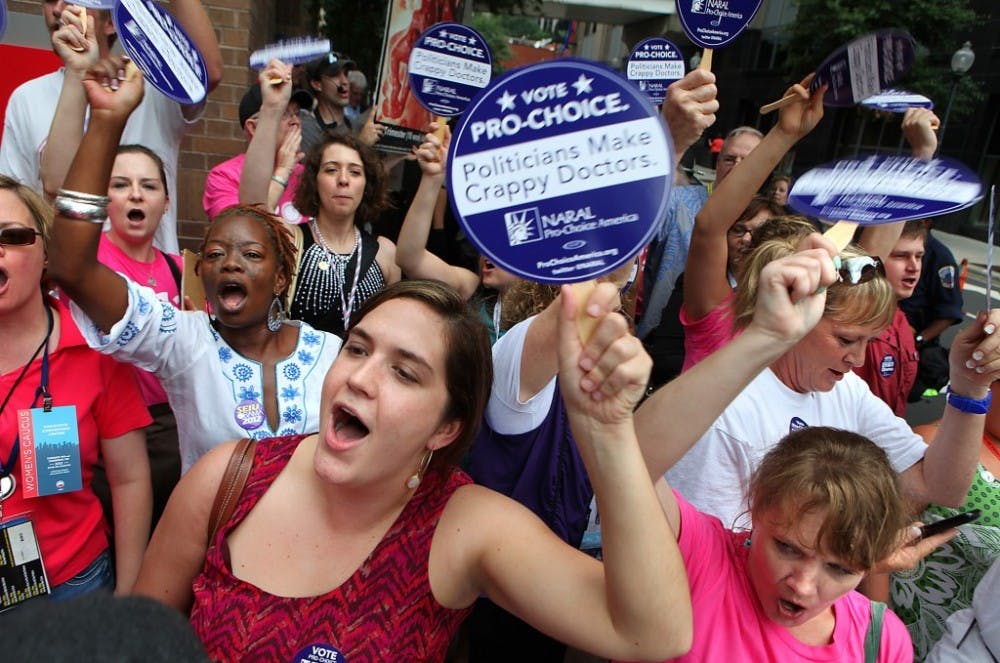40 years after the Supreme Court heard arguments in the case of Roe v. Wade, questions surrounding abortion found themselves at the court once again.
The case in question, McCullen v. Coakley, deals with a law in Massachusetts that prohibits anyone except faculty and patients from standing within 35 feet of a clinic that provides abortions. Essentially, the law is meant to prevent protestors from getting too close to an abortion clinic and those who provide or use its services.
While the Supreme Court is looking at a law in Massachusetts, Elon University law professor Steve Friedland said the high court’s ruling could potentially impact all states.
“They could be very narrow and just say, ‘This buffer zone in Massachusetts is no good, but we’re still going to uphold the idea of buffer zones, which doesn’t interfere with the freedom of speech,’” Friedland said. “But they could also go further and say, ‘These buffer zones do interfere with the freedom of speech and you have to come up with an alternative, like prosecuting individuals,’ which is what Justice Scalia in the oral arguments proposed.”
Steven Aden, an attorney with Alliance Defending Freedom on the side of the plaintiff in McCullen v. Coakley, argued that this case should guide the court in the future to not allow any similar buffer zone laws.
“Any law that creates a no-speech-zone on a public sidewalk is constitutionally suspect,” Aden said.
Aden said Massachusetts has created zones where free speech is not allowed because they do not like what anti-abortion activists have to say and calls the law a “gross violation.”
“From the beginning of the country, the Supreme Court has said that sidewalks, parks and public areas like that are places for public debate and public discourse and that they receive the highest amount of protection under the free speech in the First Amendment,” Aden said.
North Carolina does not have a buffer zone law like the one in Massachusetts, but there are city ordinances around the state that enact similar boundaries. Paige Johnson, vice president of external affairs for Planned Parenthood Action Fund of Central North Carolina, said these ordinances have kept protests peaceful at the clinics where they operate.
“We have, on some occasions, had to call the police due to protestors getting too loud or pointed in their remarks toward patients or carrying signs that were too big to meet the requirements by the city, but for the most part, protestor activity is peaceful and we are fortunate to have the ordinances that keep them a safe distance away,” Johnson said.
Both Sides of the Buffer
Johnson said the local law enforcement officials she works with are supportive of the buffer zones because they ensure the safety of all involved, including the protestors themselves.
“There have been issues in the past, though not something I can speak to seeing personally, where patients or their companions entering the building took issue with the protestors and an issue comes up. That’s something law enforcement wants to avoid,” Johnson said.
Part of the Supreme Court’s deliberations in McCullen v. Coakley was whether the tone of those who want to speak to clinic workers or individuals seeking an abortion inside the buffer zone is relevant. Eleanor McCullen, the plaintiff in the case, is an elderly woman who told the court she wishes to talk calmly with those entering the clinic and does not want to protest.
“So it’s not simply protestors, but it’s also people who want to talk to, council, pray and do many other things with the individuals,” Friedland said. “That might be relevant, it might not, but it’s something that came up during oral arguments as a factor.”
Melissa Reed, vice president of public policy for Planned Parenthood Health Systems of Central North Carolina described the type of activity she sees around her clinic as more disruptive.
“In Winston-Salem, and at other sites, we frequently have protestors who yell at patients and staff and take pictures,” Reed said.
Aden said McCullen and those like her should not be prevented from talking to those entering an abortion clinic, and any disruptive behavior that the buffer zone law says it attempts to bar is already against the law.
“Our clients –- Eleanor McCullen and others –- never engage in those kinds of things: blocking doors, obstruction, pulling on people,” Aden said. “There are laws to take care of that, so there’s no reason for these no-free-speech zones. It’s just expediency for law enforcement and for officials in Massachusetts.”
In 2000, the Supreme Court heard a similar case in Hill v. Colorado and upheld that state’s buffer zone law. However, Colorado’s law implements an eight-foot “floating zone” around patients and staff, where Massachusetts’ “floating zone” was struck down in 2000 for unfairly distinguishing between clinic staff and protestors.
One of North Carolina’s own abortion laws was recently overturned when U.S. District Court Judge Catherine Eagles ruled that a North Carolina law requiring an ultrasound and a description of the fetus by the doctor before getting an abortion is unconstitutional.
In July, the North Carolina General Assembly also put into law a series of new regulations on abortion clinics, hailed as protecting patients’ health and criticized as an attempt to restrict abortion providers by anti-abortion and pro-choice activists respectively.
Friedland, who has written books on constitutional law, said the case is not as simple as saying that the law cannot restrict someone’s right to speech. In fact, there are many laws to prevent certain types of speech and expression, like obscenity or defamation.
“The First Amendment doesn’t protect all speech, it protects the freedom of speech,” Friedland said.


